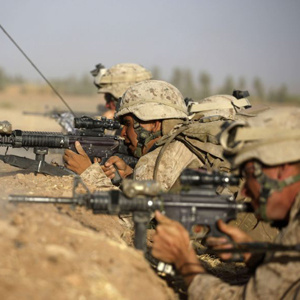The Irritating US Military Presence
By Mohammad Ebrahim Taherian, Iran’s former ambassador to Pakistan

Three American soldiers and four Pakistanis were killed in a blast in northwest Pakistan on Wednesday. Media have reported the American soldiers were part of a Social Operations team which has been training Pakistani military with counterinsurgency techniques.
This is the probably the first time the media cover news on the death of US soldiers in Pakistan. The presence of American soldiers in Pakistan is a matter of question itself. No news had leaked until now about the (backstage) agreement between the United States and Pakistan on the presence of American military in this South Asian country.
What is important is the substantial changes the agreement can bring to regional affairs and Pakistan’s domestic political scene, as the citizens of this country are already irascible about United States unpermitted military operations, i.e. the drone attacks, in Pakistani territory.
Political decision-makers in Islamabad are now liable to heavy pressure from the public opinion. Unlawful operations carried out by the Americans would not definitely help improve the situation in Pakistan. Rather, they could undermine the already shaky status quo and fuel the struggles over dominance in the country, which will not naturally leave Afghanistan immune from their ramifications.
The situation in Pakistan calls for a much higher level of sensibility. That kind of interferences in regional affairs by extraregional forces merely complicates the situation. Regional problems, including instability in Pakistan and Afghanistan, do not have a military solution.
News on US military operations in Pakistan brings to mind that the superpower is suffering from either imprudence, haste or unfamiliarity with the region. Whatever the cause, so far it has made the situation in the AfPak region more complex than before. Despite more than eight years of presence in this part of the world, Western countries that have deployed a considerable number of troops in Afghanistan are still unaware of regional nuances. No surprise though. If it was the right way around they wouldn’t have rushed Middle East so heedlessly.
The news on death of US soldiers in northwest Pakistan is the harbinger of a new trend that can deteriorate regional circumstances. Any clandestine decision made by diplomatic echelon and not supported by public opinion will just make the situation worse. My hopes are that leakage of such news would shed light on the real extent of US military presence in Pakistan so that the public opinion and the decision-makers in Islamabad could agree on a more educated solution.
This is the probably the first time the media cover news on the death of US soldiers in Pakistan. The presence of American soldiers in Pakistan is a matter of question itself. No news had leaked until now about the (backstage) agreement between the United States and Pakistan on the presence of American military in this South Asian country.
What is important is the substantial changes the agreement can bring to regional affairs and Pakistan’s domestic political scene, as the citizens of this country are already irascible about United States unpermitted military operations, i.e. the drone attacks, in Pakistani territory.
Political decision-makers in Islamabad are now liable to heavy pressure from the public opinion. Unlawful operations carried out by the Americans would not definitely help improve the situation in Pakistan. Rather, they could undermine the already shaky status quo and fuel the struggles over dominance in the country, which will not naturally leave Afghanistan immune from their ramifications.
The situation in Pakistan calls for a much higher level of sensibility. That kind of interferences in regional affairs by extraregional forces merely complicates the situation. Regional problems, including instability in Pakistan and Afghanistan, do not have a military solution.
News on US military operations in Pakistan brings to mind that the superpower is suffering from either imprudence, haste or unfamiliarity with the region. Whatever the cause, so far it has made the situation in the AfPak region more complex than before. Despite more than eight years of presence in this part of the world, Western countries that have deployed a considerable number of troops in Afghanistan are still unaware of regional nuances. No surprise though. If it was the right way around they wouldn’t have rushed Middle East so heedlessly.
The news on death of US soldiers in northwest Pakistan is the harbinger of a new trend that can deteriorate regional circumstances. Any clandestine decision made by diplomatic echelon and not supported by public opinion will just make the situation worse. My hopes are that leakage of such news would shed light on the real extent of US military presence in Pakistan so that the public opinion and the decision-makers in Islamabad could agree on a more educated solution.

